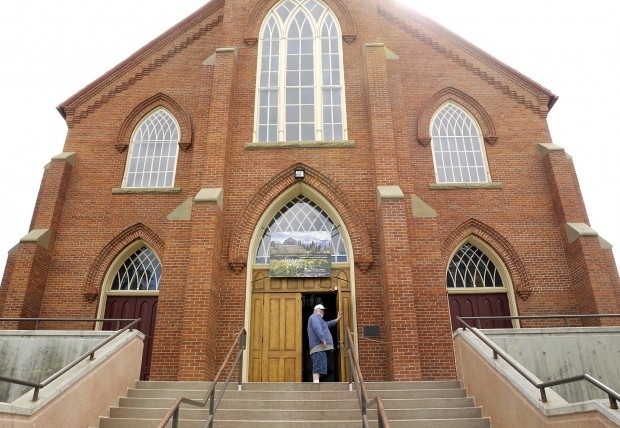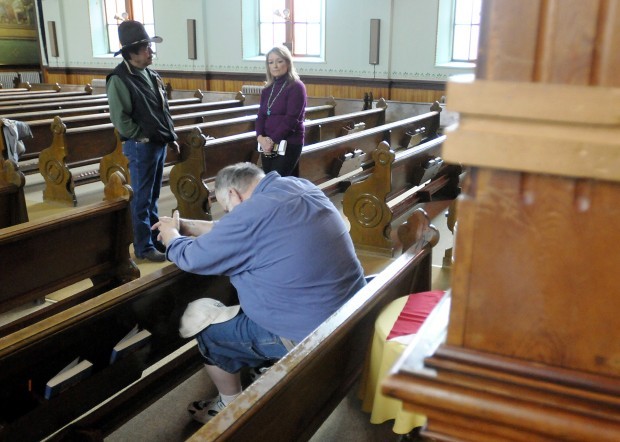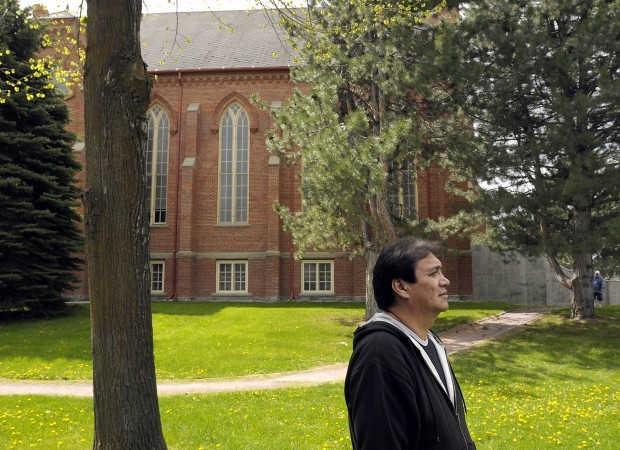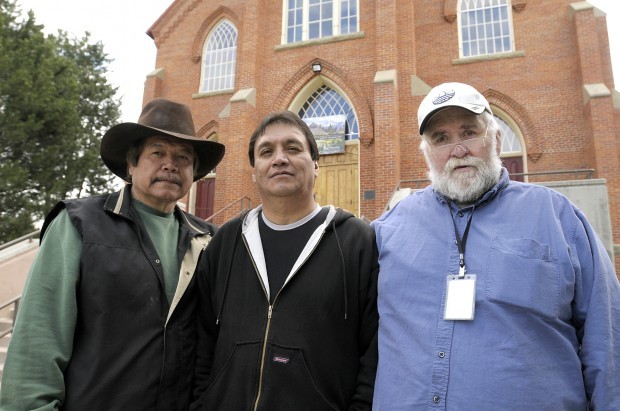Silence Shrouds St. Ignatius Jesuit Abuse Case As Settlement Vote Nears
By Gwen Florio
The Missoulian
June 6, 2011
http://missoulian.com/news/local/article_7b36eb20-8ffd-11e0-be4f-001cc4c002e0.html
Editor's note: Today, the Missoulian concludes a two-day look at the legacy of abuse at the Jesuit-run school and mission on the Flathead Indian Reservation. [See Part One: Anguish Has Never Healed for Natives Physically, Sexually Abused at St. Ignatius Mission.]
St. Ignatius – The recent $166.1 million settlement for people who were sexually abused in Jesuit-run schools and missions on Indian reservations and Alaskan villages made international headlines.
But here, where so much of the abuse occurred, the silence surrounding the case is as cold and deep as the stubbornly lingering snow on the Mission Mountains.
That's partly a measure of time: The settlement plan covers a half-century of abuse. What's news to the larger world is business as depressingly usual to people who've been living with the effects of that abuse for decades, said Jera Stewart, clinical supervisor and neuropsychologist for the Confederated Salish and Kootenai Tribes.
 |
| Garry Salois pauses recently at the entrance of the St. Ignatius mission. For Salois, who is Salish-Cree and French, the church reminds him of the physical and sexual abuse he suffered as a young boy at the hands of Jesuit priests or Jesuit-supervised nuns. Tom Bauer / Missoulian |
It's partly a measure of legality: The 500 claimants involved in the settlement must vote to approve it and the votes won't be tallied until July. Until then, said the Rev. Andrew Maddock of the St. Ignatius Church, he can't address the issue specifically with parishioners. "I've just talked about (the fact) that we need to heal."
And it's partly an unfathomable measure of pain: "You're talking about layers of trauma that happened over generations," said Salish educator Julie Cajune.
Genocide. Dislocation. Cultural obliteration. Children kidnapped into boarding schools. And, as is now being widely revealed, the extensive sexual abuse of those children.
"That this kind of violence happened to children, the worst kind of violence ... ," Cajune said. "It's such a horrific thing that people don't want to talk about it."
***
The bankruptcy settlement against the Northwest Jesuits will - if approved - do everything possible to make sure that the 500-some claimants can get help for many years hence without having to talk publicly about it, even as the religious order takes public responsibility.
About $6.5 million of the $166.1 million paid by the Jesuits and their insurers would be set aside to fund future claims, as people continue to come forward about sexual assaults experienced decades ago, said Bryan Smith, an attorney with Tamaki Law, the Yakima, Wash., firm that represents the largest number of claimants in the Lower 48 states in the Northwest Jesuits case. That money would be available until it ran out.
Still, payments averaging about $300,000 could go to those whose claims already have been verified by adjudicators after the settlement was announced in late March, Smith said. Nearly all of the claimants are Native American or Alaskan Native.
"That significant sum of money is paid to acknowledge wrongdoing," said Blaine Tamaki. "They are apologizing for their abuse."
Francis "Franny" Burke, 58, of Elmo, is one of the people represented by Tamaki's firm.
 |
| Leland Hewankorn, left, and Salois pause inside the mission they say they’ve rarely visited since the days of their abuse while at the boarding school. Photo by Tom Bauer / Missoulian |
"Speaking for all the Indian people involved with these priests, we would like an apology. That would be nice," said Burke. "But something that could really help the Indian people out is to help restore the culture and language."
As in other boarding schools around Indian Country, the last of which closed in 1968, students in the St. Ignatius school had their hair shorn and were punished if they spoke their own languages or practiced their traditions. The result was generations who feel, as Burke said, lost in an uneasy world between the two cultures.
The settlement doesn't address that issue. Perhaps it never could. But it does include several provisions designed to provide the accountability and apology many victims say they badly want.
Among them:
• For the next decade, the Oregon Province of the Society of Jesus, better known as the Northwest Jesuits, must post on its website's home page the names of all its members verified as perpetrators.
• For the next two years, the website must provide a place for victims who want to tell their stories.
• The Rev. Patrick J. Lee, who heads the province, will send personally signed letters of apology to all the claimants, stating that the abuse wasn't their fault, and that the province takes responsibility.
• During the next five years, Lee will travel to Anchorage, Seattle, Spokane and other places for private conferences with people who were abused.
• The Northwest Jesuits cannot refer to those who were abused as "alleged" claimants, victims or survivors.
• And, Lee will post on the website, and place ads in regional publications including the Missoulian, "a statement of gratitude for the survivors of sexual abuse who have had the courage to speak about the sexual abuse they endured and continue to live with every day."
***
Along with "alleged," Cajune would prefer to get rid of the word "victims," too.
"I think it's important to see Indian people as actors and not victims," she said.
Take those who endured the abuse by Jesuit priests, as well as nuns who worked under their supervision, in Jesuit missions and schools on Indian reservations around the Northwest and in Alaskan Native villages. The Oregon Province covers Oregon, Montana, Washington, Idaho and Alaska.
"It's a very brave and courageous act of resistance for these people to come out and do this," Cajune said. "It's not going to be popular."
In addition to the general squeamishness regarding public discussion of sexual abuse, there's the fact that the St. Ignatius mission - home to some of the most egregious abusers - is also a revered institution for many in the community, said Stewart, who works for the tribal health program in St. Ignatius.
"The church is still a force that people use," said Stewart. After all, she said, only a few people among the mission's religious leaders were abusers.
Most, she said, "are healers. People go there all the time for confession and absolution and to get some help."
 |
| Francis Burke walks the grounds outside the St. Ignatius mission recently. Burke, like many other abuse victims, says it caused him years of alcohol and drug abuse. Photo by Tom Bauer / Missoulian |
Indeed, Josephine Paul Quequesah, who is 74, said that while revelations about abuse at the boarding school her older sister attended surprised and saddened her, she remains a devout Catholic and volunteers at the church as a Eucharistic minister.
"All my children, my grandchildren and my great-grandchildren are baptized," said Quequesah, a member of the Salish-Pend d'Oreille Culture Committee, whose offices are near the church.
"I don't think they need to do it," she said of the lawsuits.
Leland "Jimi" Hewankorn, 59, said he heard similar remarks from friends and family members critical of his decision to join the legal action against the Northwest Jesuits.
And he knows people who also were abused, but who have kept silent.
"I'm speaking for a lot of people who are afraid to speak out," Hewankorn said.
***
The Northwest Jesuits' website - not its home page, but in the "contact" section - provides a confidential number for people to report sexual abuse by a Jesuit, or get information on counseling if they've suffered abuse.
In St. Ignatius, Stewart said that Tribal Health offers counseling to both people who have been abused and to abusers, although no program specifically addresses those involved in the Jesuit case. Publicity about that case can be helpful for people who've suffered in silence for years, believing themselves alone in their experience, she said.
"Even if they're not speaking out, they can experience healing vicariously," she said.
Dixie Trahan Brabender of Ronan, one of the first to publicly come forward in the case against the Northwest Jesuits, wanted to provide a safe place for such people.
 |
| Hewankorn, Burke and Salois stand outside the mission. They’re among some 500 people who recently reached a settlement with the Oregon Province of the Society of Jesus for reported abuse, but they say what they really want is an apology. Photo by Tom Bauer / Missoulian |
The 56-year-old Ronan resident, who is not a trained counselor, started a support group in her home for other abuse survivors. But it fell apart after just a few meetings, she said.
"It's still hard to talk about it," she said. "They stole something from us. They stole our innocence from us."
She said she'd revive the group if people wanted.
And groups like SNAP - Survivors Network of Those Abused by Priests - also offer support.
For all the considerable resources, financial and emotional, provided by the settlement, it lacks the one thing some survivors wish they'd seen: personal accountability by the priests and nuns who abused them.
But criminal charges in such cases are nearly impossible, said Smith of Tamaki Law, both because the statute of limitations has passed in many cases, and because most of the perpetrators have died.
For instance, the Rev. Augustine J. "Father Freddy" Feretti, named by victims in St. Ignatius and Idaho, died in 1982. Mother Loyola, an Ursuline nun who was a prefect at the boarding school in St. Ignatius, went from there to a mission in the Yukon before returning to the Ursuline Centre in Great Falls, where she died, said Sister Francis Xavier, the center's archivist. Both of Mother Loyola's legs were amputated before her death, said Sister Francis, who knew Mother Loyola.
"She had a very, very hard death, "she said. "She suffered a lot."
Cajune said that in Lame Deer, on the Northern Cheyenne Indian Reservation in southern Montana, elders speak of the people who survived the genocide as heroic. She suggested the same term might be applied to those taking the Jesuits to task about their abuse.
It won't undo the damage.
Most of the abusers got away.
And there will always be naysayers.
But the Northwest Jesuits can't act as though it never happened, because those who suffered fought back.
Now the world knows what was done to them.
"We stood up to some powerful people," Franny Burke said, "and I feel good about that."
Reporter Gwen Florio can be reached at 523-5268, gwen.florio@missoulian.com, or CopsAndCourts.com.
Any original material on these pages is copyright © BishopAccountability.org 2004. Reproduce freely with attribution.